#contract management software on Dynamics
Explore tagged Tumblr posts
Text
Dynamic Netsoft is a leading Microsoft Dynamics 365 implementation and ERP Consulting services company. Over the past decade, we have been helping customers transform their business processes
#Microsoft Dynamics 365 Partner#Microsoft Dynamics 365 ISV solutions#Microsoft Dynamics 365 property management#dynamics 365 property management#Property management software on Dynamics#bid management software on Dynamics#contract management software on Dynamics#dynamics 365 payroll
1 note
·
View note
Text
youtube
Dynamics 365 Contract Solution: Simplify Your Workflow Struggling to keep your contracts on track? Discover the ultimate solution with Dynamic Netsoft Technologies' Contract Management Software! ✅ Maintain budget and timeline control ✅ Ensure subcontracting projects are delivered as planned ✅ Reduce the risk of disputes and failures ✅ Ensure compliance with legal and quality standards Streamline your contract management processes and drive efficiency like never before. 📧 Contact us at: [email protected] 🌐 Learn more: Dynamics 365 Contract management Software Don't let outdated systems hold you back. Optimize your contract management today!
0 notes
Text


It can be enabled for any CRM multiline text field. We confirmed it by building a specific custom multiline text field.
To modify the field properties from the customizations, we must first enable the “Rich Text Editor Control” on this multiline text field. Accordingly, in the controls tab, click on Add Control.
And choose “Rich Text Editor Control” from the list of controls. Finally, ‘Save and publish the form to see the Rich text editor in the multiline text field.


The value entered in the Custom configuration URL for the Description field is /WebResources/msdyn_/RichTextEditorControl/RTEGlobalConfiguration.json
Microsoft is the services provider of this website resource, which makes it possible to access extra features such as the capacity to extend the editor.
To make the Rich Text Editor’s extra features available, you can design your unique web resource.


Conclusion:
The rich text editor tool will enhance the reading and comprehension of any content or descriptive information written in the multiline text field.
#Dynamic350#best contract management software#it risk management service#web application development company#power bi service#microsoft consulting services#microsoft dynamics 365 crm#microsoft dynamics 365
0 notes
Text
How to Improve Supplier Management using ERP software in India
Introduction:
In today's highly competitive business landscape, effective supplier management plays a crucial role in the success of manufacturing companies in India. Managing suppliers efficiently can significantly impact the overall productivity, cost-effectiveness, and customer satisfaction of a business. Thankfully, advancements in technology have introduced powerful solutions like Enterprise Resource Planning (ERP) software, which can revolutionize supplier management. In this blog, we will explore the benefits of utilizing ERP software and how it can enhance supplier management for manufacturing companies in India.
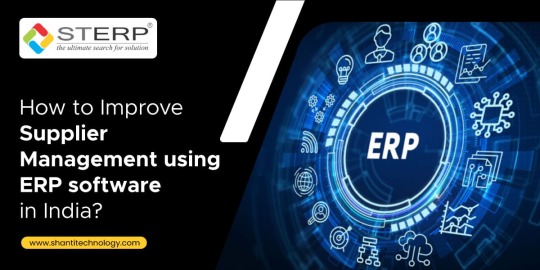
Understanding ERP Software:
ERP software integrates various business processes, including finance, inventory management, production planning, and supplier management, into a centralized system. This integration eliminates silos and provides real-time visibility into every aspect of the supply chain, enabling companies to make informed decisions quickly. ERP software acts as a comprehensive tool to streamline operations, enhance efficiency, and improve collaboration with suppliers.
Benefits of ERP Software for Supplier Management:
Streamlined Procurement Process:
ERP software simplifies the procurement process by automating tasks such as supplier selection, purchase order generation, and tracking. It centralizes supplier information, including contact details, performance metrics, and transaction history, making it easier to manage supplier relationships. This streamlining of procurement activities leads to better communication, reduced errors, and faster response times.
Improved Supplier Performance Monitoring:
By utilizing ERP software, manufacturing companies in India can monitor supplier performance more effectively. Key performance indicators (KPIs) such as delivery time, quality, and compliance can be tracked in real-time. This allows businesses to identify underperforming suppliers and take necessary actions, such as renegotiating contracts or seeking alternative options. Timely identification of issues ensures smoother operations and enhances customer satisfaction.
Enhanced Inventory Management:
ERP software provides accurate inventory tracking and forecasting capabilities, enabling companies to maintain optimal inventory levels. By integrating supplier data, businesses can automate replenishment processes, reducing stock-outs and excess inventory. Additionally, ERP software helps in analyzing supplier lead times and identifying potential delays, minimizing production disruptions and ensuring timely deliveries.
Efficient Communication and Collaboration:
Successful supplier management relies on seamless communication and collaboration between manufacturers and suppliers. ERP software facilitates efficient communication channels, enabling secure and real-time information exchange. It offers features like automated notifications, instant messaging, and document sharing, fostering transparency and improving collaboration with suppliers. This streamlined communication ensures that all parties are aligned, reducing misunderstandings and delays.
Choosing the Right ERP Software Provider in India:
When considering ERP software for supplier management, it is essential to select a reliable and experienced provider. Several ERP software providers in India cater specifically to the needs of manufacturing companies. Some popular options include SAP, Oracle, Microsoft Dynamics, and Tally ERP. Before finalizing a provider, businesses should evaluate their requirements, budget, scalability, and support services to ensure a seamless implementation and ongoing assistance.

Conclusion:
In the fast-paced manufacturing industry of India, effective supplier management is a key differentiator for success. Leveraging ERP software can significantly enhance supplier management processes, optimizing procurement, improving supplier performance monitoring, and fostering collaboration. By implementing an appropriate ERP solution from reliable providers in India, manufacturing companies can streamline operations, reduce costs, and gain a competitive edge in the market.
Remember, ERP software is not a one-size-fits-all solution. It is crucial to conduct a thorough evaluation of your company's requirements and choose the ERP system that best aligns with your specific business needs. With the right ERP software in place, manufacturing companies in India can unlock new levels of efficiency, profitability, and growth in their supplier management processes.
#ERP software providers in India#ERP for manufacturing company in India#ERP software Companies in Ahmedabad#ERP solution providers in Ahmedabad#ERP software in Ahmedabad#ERP software providers in Surat#ERP software in Surat#ERP solution providers in Surat#ERP software company in Surat#ERP software Companies in Gujarat#ERP solution providers in Gujarat#ERP for manufacturing company in Gujarat#manufacturer#business process#STERP#shantitechnology
8 notes
·
View notes
Text

Anduril Is Helping The Air Force To Develop Its Loyal Wingman Drone
Anduril is one of five companies now working on the Collaborative Combat Aircraft program, which is a top priority for the Air Force.
Joseph TrevithickPUBLISHED Jan 25, 2024 12:33 PM EST
Defense contractor Anduril has formally announced that it is one of five companies working on the US Air Force's Collaborative Combat Aircraft (CCA) advanced drone program.
Anduril
Anduril has become the first contractor to formally announce that it supporting the U.S. Air Force's Collaborative Combat Aircraft advanced uncrewed aircraft program. This comes as the service says this program is progressing slower than it would like due to budgetary issues and amid emerging concerns about the cost and capabilities of the future drones.
A brief press release Anduril put out today says it is one five vendors the Air Force has chosen to help develop its future Collaborative Combat Aircraft (CCA). The service said last year that a number of companies were under contract to conduct CCA-related work, but declined to name any of them. Last month, Breaking Defense reported that Boeing, General Atomics, Lockheed Martin, and Northrop Grumman were the other four contractors working on the CCA program, citing anonymous sources. That story added that some of these companies could be eliminated in a down-select later this year.

A rendering of Anduril's stealthy Fury drone. The company has not yet disclosed how exactly it is contributing to the CCA program. Anduril
When contacted for more information about exactly how it is now contributing to the CCA development effort, Anduril told The War Zone that it could not currently provide any more details "given sensitivities," which it did not elaborate on. We have also reached out to the Air Force for additional information.
Last year, Anduril did notably acquire small aviation firm Blue Force Technologies, which had been developing an advanced drone called Fury that has long seemed very much in line with the Air Force's CCA requirements. You can read more about the Fury, its expected capabilities, its origins, and Anduril's plans for the design in great detail in this feature The War Zone published last September.
youtube
Anduril also produces Lattice, which it describes as an "artificial intelligence-enabled software platform that enables teams of autonomous systems to dynamically collaborate to achieve complex missions, under human supervision." This could also be very relevant to the CCA program.
youtube
The CCA program is presently focused on the development and acquisition of at least one type of advanced "loyal wingman"-esque drone with a high degree of autonomy. These uncrewed aircraft are expected initially to operate closely together with stealthy Air Force F-35A Joint Strike Fighters and the future crewed sixth-generation Next Generation Air Dominance (NGAD) combat jet. The drones could potentially operate together with other types of aircraft, including non-stealthy fourth-generation fighters and the B-21 Raider stealth bomber, or independently, in the future. CCA is another element of the larger NGAD family of programs, which also includes new weapons, sensors, networking and battle management suites, advanced jet engines, and more.
"We commend Secretary Kendall and the U.S. Air Force for their leadership and commitment to integrating new technologies into the force," Anduril said in its release today. "We are honored to be the only non-traditional defense company selected to be a part of the CCA program."
The specific mention of being a "non-traditional defense company" here is noteworthy. Large established defense contractors like Lockheed Martin, Northrop Grumman, Boeing, General Atomics, and Raytheon have largely dominated the discussion about CCA-relevant developments in recent years.
youtube
Anduril regularly highlights its position as a 'disruptor' in the U.S. defense industrial space and its novel developmental, production, and general business practices, as you can read more about here. The company has steadily expanded its portfolio, with focuses on artificial intelligence software and smaller drones, since its founding in 2017.
The Air Force has also been touting its efforts to make use of novel contracting and other processes to help accelerate the CCA program. Air Force Lt. Gen. Richard Moore, Jr, the Deputy Chief of Staff for Plans and Programs, spoke about this just yesterday at a public event hosted by the Center for Strategic & International Studies (CSIS) think tank in Washington, D.C.
"The thing about this that's innovative with CCAs, in particular, is the Secretary [of the Air Force Frank Kendall] asked us: 'Please don't go to industry and give them a requirement. The last thing in the world we want to do is tell them what to build. We want to go to them with questions and we want to find out what they can do. What is the art of the possible and what is it that they could provide? And let's allow the envelope to expand by not constraining it with a requirement," Moore said.
"I think what we're starting to see now is that there are a lot of thoughts out there, some of them ... not necessarily from the large defense primes [traditional prime contractors], that really will will be beyond what we would have conceived had we decided to write a requirement," Moore added. "So it is exciting to see what's coming. And I think the the way that this is innovative is something that will transition to other programs. I don't think that this is one and done, because I think that we're going to find it to be wildly successful."
Moore also specifically mentioned "non-traditional sources" supporting the CCA program that had emerged through the Small Business Innovation Research (SBIR) program. SBIR is a U.S. government contracting mechanism that focuses on smaller deals with smaller companies to help foster technical innovation. The initial work on the Fury drone was through SBIR contracts.
All of this being said, the Air Force has made clear that it is not moving ahead with CCA as fast as it wants. The service has blamed this primarily on broader budgetary disputes between President Joe Biden's administration and Congress that are currently impacting the U.S. government as a whole. Secretary of the Air Force Frank Kendall has been particularly outspoken over the years about the problems that short-term spending packages, commonly called continuing resolutions (CR), rather than full annual budgets, impose on the U.S. military broadly.
"We're going to be limited in terms of forward progress based on the CR," Kristyn E. Jones, the senior official currently performing the duties of the Under Secretary of the Air Force, also said at yesterday's CSIS event, speaking alongside Lt. Gen. Moore. "CCA, as I mentioned – you know, we've made some progress being able to award contracts to some of the initial designers, but we can't ramp that."
The Air Force has said in the past that it wants to acquire at least 1,000 CCAs, and likely many more, and that it wants to begin major production of the drones within the next five years. At present, the expected cost of a single CCA is estimated to be around one quarter to one third of the unit price of an F-35 stealth fighter. This would put the price point for one of these future drones at between roughly $20.5 million and $27.5 million, based on public data about current F-35 unit prices.

An F-35A, at center, flies together with a Kratos XQ-58 Valkyrie drone, at left, and an F-22 Raptor stealth fighter, at right, during a test. USAF
The 1,000 CCA figured is based around a notional concept of operations involving a pair of the drones operating together with each of 200 NGAD combat jets and 300 F-35As. The Air Force has also previously said that a single crewed aircraft could oversee more CCAs in the future.
In addition, despite Moore's comments about the Air Force trying not to set firm requirements for the future CCAs, the service is clearly working to define several key parameters. From what has been disclosed so far, the CCA effort looks to be leaning toward designs with less range and higher performance than had previously been envisioned, and that will be at the high end of the expected unit cost range as a result. This, in turn, has already prompted Congress to voice concerns about the direction of the program.
The Air Force has made clear that the CCA program, however it might continue to evolve, is central to its future operational vision. The service sees the drones as especially critical for providing advanced capabilities in high volumes at a relatively low cost, a concept it currently refers to as "affordable mass." This kind of capacity is seen as particularly essential for success in any future high-end conflict, such as one against China in the Pacific.
In the meantime, much about the overall CCA program still seems to be in flux. The Air Force does now seem be working to coalesce the effort around a core group of contractors, including Anduril.
Contact the author: [email protected]
5 notes
·
View notes
Text
Unlocking Success: The Power of HR Outsourcing for Your Business
In today's fast-paced business landscape, organizations of all sizes are constantly searching for ways to optimize their operations, cut costs, and drive growth. One powerful strategy that has gained significant traction in recent years is HR outsourcing. This approach allows companies to delegate their human resources functions to specialized service providers, freeing up valuable time and resources to concentrate on their core business objectives. In this blog post, we will explore the numerous benefits of HR outsourcing and how it can be a game-changer for your company.
Cost Efficiency
Managing an in-house HR department can be costly, with expenses ranging from salaries and benefits to office space and technology. By outsourcing HR functions, you can convert these fixed costs into variable ones, paying only for the services you need when you need them. This cost-effective approach can significantly impact your bottom line and help you allocate your resources more strategically2.
Expertise and Compliance
HR outsourcing providers specialize in HR management, ensuring that your company remains compliant with ever-changing employment laws and regulations. They bring a wealth of expertise to the table, offering guidance on recruitment, training, benefits administration, and more. This expertise can help your organization avoid costly legal issues and streamline HR processes.
Time Savings
HR tasks can be time-consuming, diverting your attention from essential business activities. Outsourcing HR functions allows your internal teams to focus on core operations and strategic initiatives. With administrative burdens lifted, you can drive productivity and innovation within your organization.
Access to Cutting-Edge Technology
Many HR outsourcing providers offer state-of-the-art HR technology and software solutions that streamline processes such as payroll, time tracking, and performance management. These tools can improve efficiency, accuracy, and overall HR performance.
Scalability and Flexibility
As your business grows or contracts, your HR needs change. HR outsourcing can scale with your organization, adapting to your requirements without the hassle of hiring or laying off staff. This flexibility enables you to respond to market dynamics more efficiently.
Employee Satisfaction
When HR processes are managed efficiently and accurately, employees experience fewer disruptions, leading to increased job satisfaction. Happy employees are more engaged and productive, which, in turn, positively impacts your company's success.
Risk Mitigation
Outsourcing HR can help mitigate risks associated with employee turnover, labor disputes, and compliance issues. Your outsourcing partner can provide insights and strategies to reduce these risks and ensure smoother operations.
Strategic HR
With the administrative burden lifted, your in-house HR team can shift their focus to strategic initiatives, such as talent development, succession planning, and culture building. This shift in perspective can transform HR from a cost center into a strategic partner driving business growth.
Nonprofit HR specializing in HR outsourcing, is not just a cost-saving strategy; it's a strategic move that can transform your organization. By partnering with Nonprofit HR experts, leveraging cutting-edge technology, and optimizing your HR processes, you can streamline operations, reduce risks, and position your business for long-term success. If you're looking to unlock your company's full potential, consider exploring Nonprofit HR's services as a viable option for your organization.
2 notes
·
View notes
Text
Introducing NVOCC Software: Revolutionizing Your Logistics Operations

Are you tired of the complexities and challenges associated with managing your Non-Vessel Operating Common Carrier (NVOCC) operations? Look no further! NVOCC Software is here to transform your logistics game and streamline your business like never before.
Efficiency, accuracy, and control are at the heart of NVOCC Software. Our cutting-edge software is tailored specifically for NVOCC operators, providing a comprehensive solution that simplifies and automates your day-to-day tasks, enabling you to focus on what matters most – growing your business.
Key Features and Benefits:
Seamless Operations Management: Say goodbye to manual processes and excel spreadsheets. NVOCC Software offers a centralized platform that integrates all aspects of your operations, including bookings, documentation, container tracking, invoicing, and more. With real-time visibility, you can efficiently manage shipments, improve collaboration, and reduce costly errors.
Comprehensive Documentation: Our software handles all your documentation needs effortlessly. Generate and manage bills of lading, shipping instructions, manifests, and other essential documents in a few clicks. Ensure accuracy, compliance, and timely communication with customers, partners, and regulatory authorities, all within a unified interface.
Intelligent Rate Management: NVOCC software simplifies complex rate management processes. Set up and maintain rate contracts easily, including tariffs, surcharges, and discounts. Access dynamic pricing and instant quotes, enabling quick decision-making and enhanced customer service. Maximize profitability by optimizing your pricing strategies and staying ahead of the competition.
Real-Time Container Tracking: Stay in control of your shipments throughout their journey. NVOCC software integrates with global tracking systems, allowing you to monitor container locations, status updates, and estimated arrival times in real-time. Enhance customer satisfaction by providing accurate information and proactive communication.
Financial Management: Gain full control over your finances with our robust financial management module. Track revenue, expenses, and profitability per shipment, customer, or service route. Simplify invoicing, automate payment reconciliation, and generate insightful financial reports to make data-driven decisions.
Analytics and Reporting: Unlock valuable insights into your NVOCC operations. NVOCC software offers a comprehensive suite of analytics and reporting tools. Access key performance indicators, shipment statistics, revenue analysis, and more. Identify trends, optimize processes, and uncover new business opportunities.
Why Choose NVOCC Software?
✓ Tailored to Your Needs: Our software is designed specifically for NVOCC operators, ensuring a seamless fit for your unique requirements and workflows.
✓ Scalable and Future-Proof: NVOCC Software grows with your business. Whether you're a small startup or an established enterprise, our software accommodates your growth and evolving needs.
✓ User-Friendly Interface: Our intuitive, user-friendly interface requires minimal training, enabling you to quickly onboard your team and start reaping the benefits in no time.
✓ Cloud-Based and Secure: NVOCC Software is a cloud-based solution, providing secure access from anywhere, anytime. Your data is protected with the latest encryption and security measures, giving you peace of mind.
✓ Exceptional Customer Support: We're committed to your success. Our dedicated support team is available to assist you whenever you need help, ensuring a smooth experience throughout your journey with NVOCC Software.
Revolutionize your NVOCC operations with NVOCC Software today! Experience efficiency, accuracy, and growth like never before. Schedule a demo or get in touch with our team to discuss how NVOCC Master can transform your logistics business.
2 notes
·
View notes
Text
The Benefit of Using a Procurement Company With Logistics and Products Transportation Capabilities

Purchase is the procedure of determining as well as obtaining goods and services. It includes sourcing, acquiring as well as covers all tasks from determining prospective suppliers through to shipment from distributor to the individuals or beneficiary. Procurement is a key activity in the supply chain administration.
Logistics staff involvement in assessments offers logistics info as well as data that supports program/response application. All significant business source preparation (ERP) software application vendors like Oracle and also SAP give products around logistics and also transport monitoring. Arrangement and implementation of these products needs in-depth understanding of the market, neighborhood and also global freight plans, and also fundamental understanding of the business technique. The general price of logistics plays a vital part in product pricing. The organization is after that able to prepare ahead for the provision of the goods as well as solutions. Hence, logistics is the cornerstone of firms which create physical items. Logistics also plays a vital duty in military operations. Logistics shortages can create severe problems to the firm's bottom line.
Several business have been proclaimed to shed their market placement owing to rivals having far better logistics monitoring. Ecommerce vendors like Amazon and also ebay.com depend on state of art logistics to keep ahead of the market. Success of firms is not just a variable of how well they do their core-business (like generate a certain product) but additionally exactly how well they contract out non-core parts of their organization to 3rd parties. shipping logistics near me
Provided the intricacy of logistics as well as transport, this is a vital location for outsourcing. Experienced business understand to collaborate with one-stop stores to define vital solution degree contracts around supply chain and after that leave it to the professionals to overcome the complexity as a black box. This permits the firm to focus on where it matters, their core service. Logistics firms give myriad advantages (over attempting an in-house version):.
Logistics automation. Procurement solutions. International network. Shipping as well as freight services. Market experience as well as Quantity price cuts.
Logistics Automation deals with minimizing labor expenses by integrating wise machinery, progressed software program and dynamic tools and modern technologies. As included advantages, automation additionally reduces power as well as material wastefulness, enhances high quality and precision. By using warehousing innovations like RFID, automated placement and also storage, software program based supply tracking, companies give satisfaction with considerable expense advantage (that features co-location of your items).
Purchase services can vary from consultatory on resources purchase to rate monitoring. Companies with both straight (basic material) purchase and indirect procurement (fixing and also upkeep materials). They help come to a sweet area between amount and frequency while offering sector particular value. It is prevalent expertise that apparently inconsonant sectors make use of comparable product and also equipment. For instance, a manufacturing plant calls for safety and security and also clinical supplies, whereas, a health center needs general upkeep products. Utilizing one stop stores enable one to benefit from the large range of materials in their purview.
Shakespeare's 'all the globe is a stage' quite possibly obtains the current business versions with open market acts in between countries being widespread. The capability to supply to remote countries, while not needing to manage disambiguation of policy, money as well as language subtleties is vital to worldwide success. One stop stores have all the global network and also connections to encourage and perform your international shipping undertakings.
The aim of transport is to physically move products in a reputable and also safe way, promptly, price properly and also effectively to its location. Even if a company owns its cars, there may well be events when a demand develops for additional ability, to satisfy peak task or various other short term requirements. This can be fulfilled by the use lorries supplied by an industrial transport company (third party). Additionally using the 3rd party delivery as well as freight solution is advantageous to the company because:.
of the variable lots and also trips can be provided for. the hauler may have the ability to supply a much more affordable as well as an extra reliable solution. the obligation for administration of cars and drivers is no longer the duty of the company (hence enabling staff to focus on much more productive areas). transport logistics near me there is no need for resources to be purchased transportation. Several on-line logistics firms give consulting solutions whereby the customers can conquer their challenges that they face while trading goods. Market professionals well versed with plans and also laws, audit (like SAS70) as well as compliance requirements (for example hazardous and also ignitable materials), dynamic factors (like weather condition, socio-political events) and vendor staminas (like volume discounts and geographical insurance coverage) are gotten in touch with as well as business companies can create their own time and also cost effective logistical time table while optimizing their spending plan at the same time.
3 notes
·
View notes
Text
How business analytics can be used in supply chain management
Introduction:
In today's rapidly evolving business landscape, organizations across various industries face the challenge of managing complex supply chains efficiently. To overcome this hurdle, many companies are turning to business analytics to gain valuable insights and make data-driven decisions. In this blog post, we will explore how business analytics can be used to enhance supply chain management, specifically focusing on supply chain solutions, management software, and consulting services in Australia.
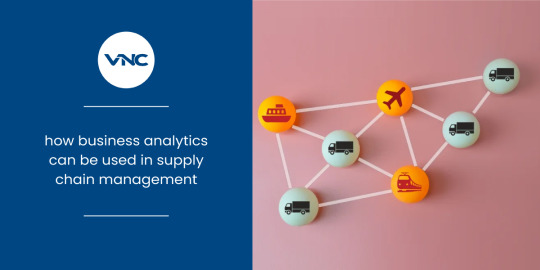
Enhancing Visibility and Transparency:
Supply chain management involves a multitude of interconnected activities, making it crucial to have a clear understanding of the entire process. By implementing advanced analytics techniques, companies can gain real-time visibility into their supply chains. This enables them to identify bottlenecks, monitor inventory levels, and track shipments, thereby improving overall operational efficiency. Supply chain solutions in Australia, such as predictive analytics models, can help identify potential disruptions and take proactive measures to mitigate risks.
Demand Forecasting and Inventory Optimization:
Accurate demand forecasting is essential for efficient supply chain management. Business analytics leverages historical data, market trends, and customer insights to predict future demand patterns more accurately. By applying advanced forecasting algorithms, businesses can optimize inventory levels, minimize stockouts, and reduce excess inventory costs. With supply chain management software in Australia, companies can automate the process of demand forecasting and leverage predictive analytics to make informed decisions regarding production, procurement, and distribution.
Streamlining Supplier Management:
Supplier management plays a critical role in supply chain performance. By analyzing supplier data, including quality, delivery times, and cost, organizations can identify high-performing suppliers and build stronger partnerships. Business analytics tools provide a comprehensive view of supplier performance, allowing companies to optimize sourcing strategies, negotiate better contracts, and identify alternative suppliers in case of disruptions. Through supply chain management consulting in Australia, businesses can leverage the expertise of industry professionals to design effective supplier management frameworks.
Optimizing Logistics and Transportation:
Efficient logistics and transportation are vital for smooth supply chain operations. By leveraging analytics, organizations can optimize routing, mode selection, and load planning to minimize transportation costs and improve delivery timelines. Predictive analytics models can anticipate potential transportation delays and help companies proactively manage risks. Additionally, supply chain management software in Australia provides real-time tracking and monitoring capabilities, enabling businesses to track shipments and make informed decisions to ensure timely deliveries.
Continuous Improvement through Data-Driven Insights:
One of the key advantages of using business analytics in supply chain management is the ability to gain actionable insights for continuous improvement. By analyzing historical and real-time data, companies can identify inefficiencies, optimize processes, and implement cost-saving measures. Furthermore, analytics tools enable businesses to conduct scenario analysis and simulate different supply chain strategies to identify the most effective approaches. This data-driven decision-making approach empowers organizations to stay agile and responsive in the face of changing market dynamics.
Conclusion:
In the era of data-driven decision-making, leveraging business analytics has become essential for effective supply chain management. Supply chain solutions, management software, and consulting services in Australia provide companies with the tools and expertise needed to optimize their supply chains. By enhancing visibility, improving demand forecasting, streamlining supplier management, optimizing logistics, and leveraging data-driven insights, organizations can achieve higher operational efficiency, reduced costs, and improved customer satisfaction. Embracing business analytics in supply chain management is a strategic move that helps organizations stay ahead of the competition in today's dynamic business landscape.
#supply chain solutions in Australia#supply chain management software in Australia#supply chain management consulting Australia#vncglobal
3 notes
·
View notes
Text
Dynamic Netsoft: Transforming Industries with Innovative D365 Solutions
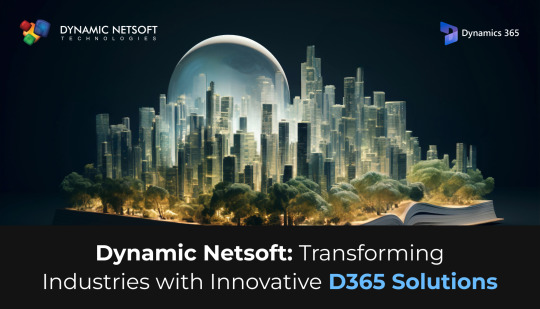
How can Dynamic Netsoft’s innovative Microsoft Dynamics 365 ISV solutions help your business streamline operations, enhance decision-making, and drive sustainable growth?
Revolutionizing Business with Innovative Microsoft Dynamics 365 Solutions
In today’s fast-paced business environment, adaptability and innovation are key to staying competitive. At Dynamic Netsoft Technologies, we empower businesses with cutting-edge Microsoft Dynamics 365 solutions designed to meet the unique challenges of diverse industries.
Our advanced Independent Software Vendor (ISV) solutions seamlessly integrate with Microsoft Dynamics 365, enabling organizations to optimize processes, enhance decision-making, and drive sustainable growth.
Transforming Business with Industry-Specific Solutions
Here’s how our solutions deliver value across sectors:
✅ RealEstateProStreamline property management with solutions that enhance tenant relationships, simplify lease administration, and maximize operational efficiency.
✅ Contract ManagementSimplify contract handling with a centralized platform designed to improve compliance and reduce administrative complexity.
✅ Bid ManagementBoost accuracy, speed up bid processes, and increase success rates with tools designed for precision and efficiency.
✅ Treasury ManagementOptimize financial operations with tools that deliver transparency, control, and better cash flow management.
✅ Investment Portfolio ManagementLeverage real-time insights and advanced analytics for smarter, data-driven investment decisions.
✅ AXOnePaySimplify and secure payment processing with fully integrated solutions that align with your business needs.
Built on One Dynamics 365, Designed for Success
Our solutions are powered by One Dynamics 365, complemented by our suite of 6 Independent Software Solutions (ISVs). This combination delivers flexibility, scalability, and efficiency, helping businesses achieve their unique goals with ease.
By turning Microsoft Dynamics 365 into a dynamic platform for growth, we enable businesses to operate smarter and adapt faster in a rapidly evolving world.
A Partner with Global Reach and Local Expertise
From our hubs in USA, Singapore, India, UAE, and KSA, we deliver global solutions with a local touch. Our team is dedicated to understanding your specific needs and delivering solutions that create long-term value for your business.
Discover How Innovation Can Empower Your Business
Now is the time to embrace tools that transform how you work.
🔗 Explore our solutions and learn more: dnetsoft.com📩 Have questions? Reach out to us at enquiry@ dnetsoft.com .
Let’s reimagine what’s possible for your business and shape a brighter future together!
#Dynamics365#MicrosoftDynamics#ERPUpgrade#AXtoD365#DigitalTransformation#BusinessAutomation#CloudERP#FinanceAndOperations#D365Migration#EnterpriseSolutions
0 notes
Text
HR Courses in Bangalore

Why Choose HR as a Career?
HR is a crucial function in any organization, ensuring smooth operations by managing recruitment, payroll, employee engagement, compliance, and performance management. A career in HR offers stability, growth, and diverse opportunities across industries. By acquiring the right HR certifications, you can enhance your expertise and gain a competitive edge.
Best HR Courses in Bangalore
Bangalore offers a variety of HR training programs catering to fresh graduates, working professionals, and entrepreneurs. One of the leading institutes offering comprehensive HR courses is Zonal Tech Solution, Bangalore. This institute provides industry-relevant training that equips learners with practical knowledge and hands-on experience.
1. HR Generalist Training
Course Overview:
Covers fundamental HR functions
Payroll processing and compliance
Employee relations and performance management
HR analytics and reporting
Who Should Enroll?
Fresh graduates aspiring for an HR career
Professionals shifting from another domain to HR
2. HR Payroll Training
Course Overview:
Salary structure and components
Statutory compliance (PF, ESI, TDS, Gratuity)
Compensation and benefits
Payroll software training
Who Should Enroll?
HR professionals handling payroll
Entrepreneurs managing their company’s salary structure
3. HR Recruitment Training
Course Overview:
Talent acquisition and sourcing strategies
Interviewing techniques and hiring best practices
Offer negotiation and onboarding
Recruitment analytics
Who Should Enroll?
Recruitment specialists looking for advanced skills
HR managers handling hiring functions
4. HR Analytics Course
Course Overview:
Data-driven HR decision-making
Workforce analytics and trends
HR metrics and dashboards
Predictive analytics in HR
Who Should Enroll?
HR professionals wanting to leverage data for better decision-making
Business leaders aiming to integrate HR analytics
5. HR Compliance and Labor Law Training
Course Overview:
Indian labor laws and HR policies
Industrial relations and grievance handling
Contract labor and legal documentation
Audits and compliance management
Who Should Enroll?
HR managers dealing with legal compliance
Business owners ensuring compliance with labor laws
6. Advanced HR Management Course
Course Overview:
Strategic HR planning and leadership
Employee engagement and retention
Organizational development
Change management in HR
Who Should Enroll?
Senior HR professionals
Business leaders managing HR functions
7. HRMS and HR Technology Training
Course Overview:
HR software and automation tools
Cloud-based HR management
Digital transformation in HR
HRIS implementation and management
Who Should Enroll?
HR professionals adapting to technology-driven HR
IT professionals integrating HR systems
Why Choose Zonal Tech Solution, Bangalore?
Zonal Tech Solution, Bangalore, stands out as a premier training institute for HR courses due to its:
Industry-relevant curriculum: Courses designed by HR experts aligned with corporate requirements.
Hands-on training: Practical exposure through case studies, simulations, and live projects.
Certification programs: Recognized HR certifications to enhance career prospects.
Placement support: Assistance in job placements with reputed companies.
Expert trainers: Faculty with extensive industry experience in HR.
Career Opportunities After Completing HR Courses
Upon completing an HR course from Zonal Tech Solution, Bangalore, multiple career paths open up, including:
HR Generalist
HR Manager
Payroll Specialist
Talent Acquisition Specialist
HR Analyst
Compliance Manager
Learning and Development Manager
Final Thoughts
Bangalore offers immense opportunities for those looking to build a career in HR. With Zonal Tech Solution, Bangalore, you can gain the necessary skills and knowledge to excel in this dynamic field. Whether you are a beginner or an experienced professional, investing in HR training can significantly boost your career. Enroll today and take the first step toward becoming a proficient HR professional!
0 notes
Text
Say goodbye to contract chaos with Microsoft Dynamics 365 Contract Management. Simplify and automate your contracts to optimize construction and engineering projects effortlessly. Unlock strategic solutions for smoother operations today
0 notes
Text
Streamline and Automate Business Operations with Contract Management Software
Businesses are increasingly turning to contract management software to streamline these processes and avoid the pitfalls of manual contract management. By automating workflows, keeping track of contract milestones, and offering real-time visibility, businesses can greatly lower risks and boost compliance. Studies show that automation in contract management can save up to 82% of time spent on contract approvals, drastically enhancing operational efficiency. In this blog post, we’ll explore the key benefits and features of contract management software and how it can transform your business operations, from reducing errors to speeding up contract cycles. https://dnetsoft.com/blog/streamline-and-automate-business-operations-with-contract-management-software/
0 notes
Text
Unleashing the Power of Microsoft Dynamics 365
Microsoft Dynamics 365 is a powerful tool that combines the capabilities of CRM and ERP systems into one unified platform. In this article, we dive into the details of what makes it so special and why utilizing Microsoft Dynamics 365 is essential for any business.
Introduction to Microsoft Dynamics 365
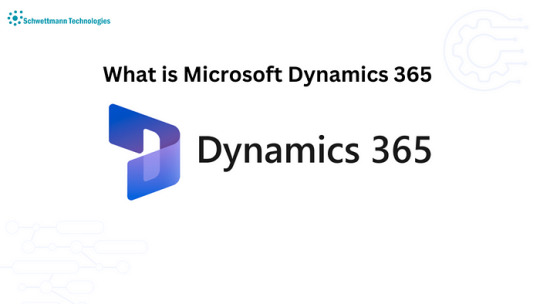
Microsoft Dynamics 365 is a cloud-based business applications platform that combines CRM and ERP capabilities into a single, integrated solution. It enables businesses to manage their customers, sales, marketing, operations, and financials in a single system.
Dynamics 365 offers a comprehensive set of features and functionality for businesses of all sizes. It includes everything from basic CRM and ERP capabilities to advanced features such as artificial intelligence (AI), predictive analytics, and IoT integration.
Dynamics 365 is built on Microsoft’s Azure cloud platform and uses the Common Data Model (CDM) to provide a unified data model for all entities across the various applications. This makes it easy to integrate Dynamics 365 with other Azure-based services and third-party applications.
The benefits of using Microsoft Dynamics 365 include:
Increased productivity: Dynamics 365 provides a single platform for businesses to manage their customers, sales, marketing, operations, and financials. This saves time and increases efficiency by eliminating the need to switch between multiple systems.
Improved decision making: With all data stored in a single system, businesses can gain insights into their operations and make better informed decisions. The built-in reporting and analytics tools give users the ability to slice and dice data in any way they want.
Flexibility and scalability: Dynamics 365 is a cloud-based solution that can be easily scaled up or down to meet the changing needs of businesses. The pay-as-you
Benefits of Using Microsoft Dynamics 365

Microsoft Dynamics 365 is a cloud-based business application platform that enables organizations to manage their customers, sales, marketing, and operations. The platform provides a single view of the customer, making it easy for organizations to track and manage customer interactions across all channels. Dynamics 365 also offers a robust set of features for managing sales and marketing activities, including lead management, campaign management, and opportunity management. In addition, the platform provides comprehensive tools for managing operations, such as financials, supply chain management, and project service automation.
What Microsoft Dynamics 365 Can Do For You

Microsoft Dynamics 365 is a cloud-based business applications platform that helps organizations streamline their operations, improve customer engagement, and boost productivity. The platform offers a complete set of tools for managing finances, customers, sales, marketing, and operations. Dynamics 365 also enables organizations to build custom apps to suit their specific needs.
Dynamics 365 can help your organization in a number of ways:
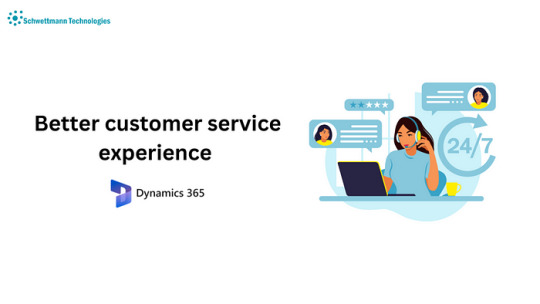
-Improving customer engagement: The platform provides a complete set of tools for managing customer relationships, including CRM, marketing automation, and social listening. With these tools, you can nurture your leads, close more deals, and build lasting relationships with your customers.
-Streamlining operations: Dynamics 365 gives you a complete view of your business so you can make informed decisions and streamline your operations. The platform helps you automate repetitive tasks so you can focus on more important things.
– Boosting productivity: Dynamics 365 includes powerful collaboration tools that help you work smarter and get more done. With features like document management, task management, and team chat, you can stay organized and get work done faster.
Microsoft Dynamics 365 is a powerful platform that can help your organization streamline its operations, improve customer engagement, and boost productivity. If you’re looking for a complete solution for managing your business, Dynamics 365 is the right choice for you.
How To Get Started With Microsoft Dynamics 365

If you’re looking for a powerful and versatile CRM system, Microsoft Dynamics 365 is a great option. In this article, we’ll give you an overview of what Microsoft Dynamics 365 is and how it can benefit your business. We’ll also provide some tips on how to get started with using the system.
Microsoft Dynamics 365 is a cloud-based CRM system that offers a variety of features and tools to help businesses manage their customer relationships. The system includes powerful automation capabilities, making it easy to automate tasks and workflows. Dynamics 365 also integrates with other Microsoft products, such as Office 365, making it easy to use the data and insights from your CRM system in other applications.
There are many reasons why you should consider using Microsoft Dynamics 365 for your CRM needs. The system is highly customizable, making it easy to tailor the system to your specific business needs. It’s also very user-friendly, so you’ll be able to get up and run quickly without having to invest a lot of time in training. And because it’s cloud-based, you can access your data and insights from anywhere, at any time.
If you’re ready to get started with Microsoft Dynamics 365, there are a few things you need to do first. First, you’ll need to sign up for an account with Microsoft. Once you have an account, you can then sign in and access the various features and tools offered by the system.
Tips for Using and Optimizing Microsoft Dynamics 365
In summary, Microsoft Dynamics 365 is a powerful management solution that may assist companies in optimizing their operations and enhancing their bottom line. This may be the answer for you if you’re seeking for a strategy to manage your money better.
The use of Microsoft Dynamics 365 can help businesses cut costs and save time. Users can also gain real-time business information from the software, which can aid them in making wiser financial decisions. All things considered, Microsoft Dynamics 365 is a potent management solution that can assist companies in improving their bottom line.
#Microsoft Dynamics 365#best contract management software#power bi service#it risk management service#web application development company#best cybersecurity consulting firms#microsoft dynamics 365 crm
1 note
·
View note
Text
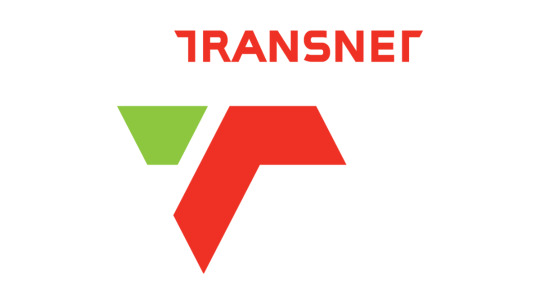
Analyst IT Support x 13 – Apply Now Are you looking for Transnet jobs in Durban, Johannesburg, or other locations across South Africa? Transnet, one of the largest state-owned enterprises in the country, is offering exciting opportunities for IT professionals. With available Transnet jobs in various regions, this is your chance to join a leading organization that plays a critical role in South Africa’s logistics and freight rail industry. Below, we provide a detailed overview of the Analyst: IT Support x 13 positions, including responsibilities, qualifications, and how to apply. Listing Reference: req2726 Listing Status: Open Position Summary - Company: Transnet - Industry: Logistics and Freight Rail - Job Category: Information Technology (IT Support) - Location: Various Locations (Koedoespoort, Durban, Germiston, Salt River, Bloemfontein, Uitenhage) - Contract Type: Non-Permanent - Remuneration: Competitive, based on experience and qualifications - EE Position: Yes (Preference will be given to designated groups in line with Transnet’s Employment Equity Plan) - Closing Date: 26 February 2025 Introduction Transnet is a cornerstone of South Africa’s economy, specializing in Transnet Freight Rail, ports, and pipelines. The organization is committed to innovation, sustainability, and excellence in service delivery. As part of its ongoing growth strategy, Transnet is seeking 13 skilled IT Support Analysts to join its team. These roles are critical in ensuring seamless IT operations across various sites, enabling the organization to maintain its high standards of efficiency and reliability. If you have a passion for IT, a strong technical background, and the ability to provide exceptional support in a dynamic environment, this could be the perfect opportunity for you. Job Description The Analyst: IT Support role is a multi-faceted position that requires a proactive individual to provide technical support and ensure the smooth functioning of IT systems. Key responsibilities include: - Technical Support: - Serve as the first point of contact for end-users requiring IT assistance. - Install, diagnose, repair, and upgrade computer hardware and software. - Troubleshoot and resolve issues related to desktops, servers, printers, and networking equipment. - Ensure uptime of network, internet, and mail connectivity. - Disaster Recovery and Business Continuity: - Implement and manage backup solutions for user data on laptops, iPads, and cellular devices. - Assist with disaster recovery planning and execution. - ICT Security: - Maintain and implement ICT security measures to protect organizational data and systems. - Project Management: - Execute minor ICT-related projects, including setup and configuration of video conferencing facilities, boardroom equipment, and digital signage. - Manage third-party vendors and ensure compliance with service level agreements. - Inventory Management: - Maintain accurate records of software licenses and hardware inventories. - Monitor user disk usage and mailbox sizes to ensure optimal system performance. - Training and Development: - Provide technical support during training sessions and special projects. - Share ICT tips and best practices with end-users to enhance their computing experience. Ideal Candidate The ideal candidate for this role will possess a combination of technical expertise, problem-solving skills, and a customer-focused mindset. Key qualifications and experience include: - Education: - Minimum 3-Year Diploma (NQF 6) in Information Systems, Computer Science, or a related field. - A+ and N+ Certifications are mandatory. - ITIL Foundation Certification is advantageous. - Experience: - 3-5 years of experience in desktop support, preferably in a large organization with complex systems. - Exposure to hardware and software maintenance, multi-device support, and basic server configurations. - Skills: - Strong analytical and troubleshooting abilities. - Excellent communication and interpersonal skills. - Proficiency in managing ICT security measures and backup solutions. - Ability to work under pressure and meet tight deadlines. Role Responsibility The Analyst: IT Support will play a pivotal role in ensuring the reliability and efficiency of Transnet’s IT infrastructure. Key responsibilities include: - Providing first-line support for all IT-related issues, including hardware, software, and networking. - Managing and maintaining ICT equipment, including printers, servers, and video conferencing facilities. - Collaborating with third-party vendors to resolve complex technical issues. - Ensuring compliance with ICT security policies and procedures. - Supporting end-users with access to servers, applications, and other IT resources. - Monitoring and optimizing system performance to minimize downtime. Skills & Attributes To excel in this role, candidates should demonstrate the following skills and attributes: - Technical Proficiency: - In-depth knowledge of hardware and software troubleshooting. - Experience with multi-device support (mobile, printers, tablets). - Strategic Thinking: - Ability to align tactical solutions with long-term organizational goals. - Customer Focus: - Strong commitment to delivering exceptional service to end-users. - Problem-Solving: - Aptitude for diagnosing and resolving complex technical issues. - Team Collaboration: - Ability to work effectively with cross-functional teams and external vendors. - Adaptability: - Willingness to embrace change and learn new technologies. How to Apply If you meet the qualifications and are excited about the opportunity to join Transnet, don’t miss out on these Transnet vacancies. To apply, follow these steps: - Visit the official Transnet careers portal. - Search for the reference number req2726. - Submit your application before the closing date: 26 February 2025. Ensure that your application includes a detailed CV, certified copies of your qualifications, and a cover letter highlighting your relevant experience. Why Join Transnet? - Impactful Work: Contribute to the success of South Africa’s logistics and freight rail industry. - Career Growth: Access to training and development opportunities to enhance your skills. - Diverse Environment: Work in a multicultural and inclusive workplace. - Competitive Benefits: Enjoy a comprehensive remuneration package and employee benefits. The Analyst: IT Support x 13 positions at Transnet offer a unique opportunity to advance your career in IT while contributing to the success of a leading organization. Whether you’re interested in Transnet jobs in Durban, Johannesburg, or other locations, this role provides a platform to showcase your technical expertise and make a meaningful impact. Apply here IT Support Analyst (18 Posts) Listing Reference: req2703Listing Status: Open Position Summary Company: Transnet Freight RailIndustry: Information TechnologyJob Category: IT SupportLocation: Bloemfontein, South AfricaContract Type: Non-PermanentRemuneration: Market-RelatedEE Position: YesClosing Date: To Be Confirmed Introduction Transnet Freight Rail, a division of Transnet, is looking for an IT Support Analyst to provide technical support for information technology equipment at its Bloemfontein site. The role involves diagnosing, repairing, upgrading, and maintaining IT hardware and software systems. This is a great opportunity for tech-savvy professionals who want to work with one of South Africa’s largest transport and logistics companies. Job Description The IT Support Analyst will be responsible for providing efficient and continuous desktop support to Transnet users. The role ensures business operations run smoothly with minimal IT-related disruptions. The position will also involve aspects of network administration, disaster recovery, security solutions, and business continuity planning. Key Responsibilities: - Provide first-line support for all IT-related issues, including network connectivity, server access, and workstation performance. - Install, configure, troubleshoot, and maintain all computer hardware and software. - Ensure smooth network operations by maintaining LAN, WAN, WiFi, and remote access (APN, 3G, etc.) for all company devices. - Perform backup management of laptops, tablets, cellular devices, and small systems. - Provide assistance with server configurations, including file sharing and printer setups. - Implement ICT security measures and ensure compliance with company policies. - Offer technical support for video conferencing facilities, boardroom equipment, and digital signage. - Manage ICT-related procurement, including repairs and replacements of equipment. - Conduct quality assurance testing on new processes, software, and hardware. - Provide project management for minor ICT-related works for business units. - Maintain software licenses and hardware inventory. - Oversee third-party service providers working within the ICT environment. Ideal Candidate The ideal candidate for this position should have a strong background in IT support, with a keen ability to troubleshoot and resolve issues effectively. Experience working in large organizations, particularly within Transnet Freight Rail or related industries, will be advantageous. Qualifications & Experience: - Diploma or Degree in Information Systems, Computer Science, or related field (NQF 6/7). - A+ and N+ Certifications (Mandatory). - ITIL Foundation Certification (Advantageous). - 5+ years of experience in desktop support with exposure to brands like Lenovo, HP, Dell, Acer, or Asus. - Must possess a valid driver’s license (Code 08) and have reliable transport. - Ability to travel to various Transnet sites and occasionally to neighboring countries. Role Responsibilities The IT Support Analyst will be instrumental in maintaining IT infrastructure and ensuring the seamless operation of Transnet’s systems. Some of the critical role responsibilities include: Technical Support & Troubleshooting: - Providing end-user support for hardware, software, network, and in-house business applications. - Diagnosing and resolving desktop, server, and network issues efficiently. - Ensuring 100% uptime of network, mail connectivity, and system logon access. Infrastructure & Network Management: - Setting up and configuring networked and standalone printers, SAP printers, and other peripherals. - Managing backup tapes, off-site storage areas, and disaster recovery processes. - Performing routine IT maintenance for computer rooms and related infrastructure. Security & Compliance: - Implementing and maintaining ICT security measures to protect business operations. - Ensuring compliance with corporate governance policies in IT operations. IT Procurement & Project Management: - Managing IT equipment procurement to ensure reduced downtime. - Overseeing third-party contracts for outsourced IT services. - Executing small-scale ICT projects for business units as required. Skills & Attributes To excel in this role, the candidate should possess the following skills and competencies: Technical Skills: - Strong understanding of hardware and software maintenance. - Proficiency in multi-device support, including laptops, mobile devices, printers, and networking tools. - Expertise in Windows operating systems, Microsoft Office Suite, and network configurations. Analytical & Problem-Solving Skills: - Ability to analyze, diagnose, and resolve technical issues efficiently. - Strong strategic thinking and business acumen. Communication & Leadership: - Excellent verbal and written communication skills to interact with team members and clients. - Strong ability to collaborate, network, and influence stakeholders. Adaptability & Innovation: - Ability to embrace change and quickly adapt to new technologies. - Proactive approach towards innovation and process improvement. Why Join Transnet? Transnet Freight Rail offers an exciting opportunity to work in a fast-paced and dynamic environment. Employees benefit from career growth opportunities, industry exposure, and a chance to be part of South Africa’s leading logistics company. How to Apply? Interested candidates should apply online by submitting their CVs and relevant documentation before the closing date. Ensure that your application reaches Transnet HR before the deadline to be considered. The IT Support Analyst position at Transnet Freight Rail presents an excellent opportunity for tech professionals looking to advance their careers in the IT sector. With the responsibility of ensuring seamless network connectivity, hardware/software support, and security compliance, this role is critical in maintaining Transnet’s IT infrastructure. If you have the qualifications and skills required, don’t miss this chance to be part of a leading logistics organization. Apply today and take the next step in your career! Use the Given Links to Apply: IT Support Analyst Richards Bay, South Africa IT Support Analyst Johannesburg, South Africa IT Support Analyst Postmasburg, South Africa IT Support Analyst Port Elizabeth, South Africa IT Support Analyst East London, South Africa IT Support Analyst Saldanha, South Africa IT Support Analyst Cape Town, South Africa IT Support Analyst Braamfontein, South Africa IT Support Analyst Pretoria, South Africa IT Support Analyst Ladysmith, South Africa IT Support Analyst City Deep, South Africa IT Support Analyst Springs, South Africa IT Support Analyst Bellville, South Africa IT Support Analyst Krugersdorp, South Africa IT Support Analyst Pietermaritzburg, South Africa IT Support Analyst Kilner Park, South Africa IT Support Analyst Nelspruit, South Africa IT Support Analyst Capital Park, South Africa Operating Division: TPT POD Corporate H/O How to Apply Transnet 2025 Transnet is seeking an experienced and visionary General Manager: Engineering, Maintenance & Operations Technology to spearhead the development and execution of integrated strategies aligned with Transnet Port Terminals' (TPT) capital investment and growth agenda. This high-level position requires a strategic leader who can drive technology-driven engineering and maintenance excellence while ensuring compliance with statutory regulations. Operating Division: TPT POD Corporate H/O - Employee Group: Permanent - Department: Office of CE - Location: Durban - Reporting To: Chief Executive - Grade: B - Reference: req2663 - Application Deadline: 07 February 2025 Key Responsibilities - Lead the formulation and implementation of an integrated engineering, maintenance, and operations technology strategy. - Develop a structured approach to engineering management that enables operational success and long-term business sustainability. - Define future technological advancements required to meet the company’s strategic and business needs. - Oversee adherence to policies, legislative frameworks, and regulatory standards. - Ensure seamless infrastructure maintenance planning and execution to optimize asset performance. - Establish a robust technical model to manage Transnet Port Terminals' core technical disciplines, including Mechanical, Electrical, and Control & Instrumentation. - Maintain the integrity of terminal equipment and infrastructure through efficient operating and maintenance strategies. - Lead large-scale, cross-functional strategic projects and align capital projects with future operational technology. - Oversee supplier, contract, and service level agreement (SLA) management. - Ensure effective planning and execution of engineering development programs. - Implement best practices in Asset Life Cycle Management to extend the design life of assets. - Conduct comprehensive financial, investment, and risk analyses. - Ensure project execution meets time, budget, quality, and safety requirements. - Manage business risks and recommend optimal financial models for investment sustainability. - Foster compliance with governance, statutory, and regulatory obligations. - Lead, mentor, and develop a high-performing team of engineering and technical professionals. Minimum Qualifications & Experience - Educational Requirement: Bachelor’s Degree in Engineering (BSc/B-Eng) or equivalent. - Professional Registration: Must be registered as a Professional Engineer (Pr. Eng.). - Postgraduate Advantage: A postgraduate qualification in Business Management or Finance is highly desirable. - Experience: At least 15 years of experience in engineering within a public or private sector organization, including a minimum of 7 years at a senior or executive management level. - Specialized Knowledge: Extensive experience in engineering operations management. - Compliance Requirement: Must adhere to trust and financial integrity requirements as per the National Credit Act Amendment 19. - Driver’s License: Code 8 license required. - Travel: Flexibility to travel as per business needs. Key Competencies & Skills Technical & Functional Expertise - Strategic scope, time, and cost management. - Ability to manage quality, human resources, and communication within projects. - Strong risk assessment and mitigation capabilities. - Expertise in operational readiness, commissioning, and project transitions. - Sound knowledge of health, safety, and environmental regulations. - Proficiency in project performance evaluation and continuous improvement. Governance & Leadership Excellence - Strong corporate governance and regulatory compliance. - Decisive management decision-making abilities. - Ability to adapt to technological advancements and future industry trends. - Proficiency in business performance management and sustainability strategies. Behavioral & Leadership Traits - Visionary leadership with a strong focus on strategy execution. - Ability to inspire and motivate teams towards business success. - Proactive relationship management with internal and external stakeholders. - Commitment to corporate governance and compliance frameworks. - Strong personal mastery and professional growth orientation. Employment Equity Statement Transnet is committed to employment equity and diversity. Preference will be given to qualified candidates from designated groups in accordance with the company’s Employment Equity Plan and organizational objectives. Specialist: Compliance x 8 – Transnet Engineering Transnet Engineering is seeking skilled compliance specialists to support its Supply Chain Management (SCM) division in mitigating risks and ensuring adherence to governance frameworks. This role plays a critical function in upholding corporate integrity, driving compliance awareness, and embedding a culture of risk management within SCM operations. - Operating Division: Transnet Engineering - Employee Group: Non-Permanent - Department: Supply Chain Management - Location: Kilner Park - Reporting To: Head: Governance & Compliance - Grade: F - Reference: req2656 - Closing Date: 06/02/2025 Key Responsibilities 1. Supply Chain Compliance & Risk Framework Alignment - Assist in developing and maintaining compliance controls in adherence to regulatory frameworks, mitigating identified risks. - Ensure the effectiveness of Business Critical Controls (BCCs) within Supply Chain Management. - Maintain an up-to-date compliance manual addressing potential compliance risks, objectives, and legal standards. - Conduct continuous monitoring and risk reviews, ensuring that process owners implement risk mitigation strategies. 2. Compliance Training & Awareness - Develop training materials and conduct educational sessions for SCM stakeholders on compliance and risk management frameworks. - Disseminate information on evolving compliance laws, rules, and standards across SCM divisions. Read the full article
0 notes
Text
What are the unique features of Real-estate Pro and Bid Management solutions?

Unique Features of Real-estate Pro and Bid Management Solutions 🏢📑
In the fast-evolving real estate and construction industries, having specialized software like Real-estate Pro and Bid Management solutions can be a game-changer. These tailored ERP solutions streamline complex processes, enhance decision-making, and empower businesses to achieve their goals efficiently.
Real-estate Pro: Unique Features 🏘️✨
Property Lifecycle Management 🏡Manage every stage of a property’s lifecycle, from acquisition and development to sales, leasing, and maintenance. This feature ensures seamless management of all real estate assets.
Sales and Leasing Automation 📈Streamline sales and leasing processes with tools for managing inquiries, contracts, payments, and renewals. Track prospects and automate follow-ups to boost revenue generation.
Financial Integration 💰Integrated accounting and financial tools simplify budgeting, forecasting, and payment processing. Real-time financial data helps you make informed decisions.
CRM for Real Estate 🤝Maintain a comprehensive database of clients, prospects, and tenants. Track interactions, manage communication, and build stronger relationships for long-term success.
Regulatory Compliance 📜Stay compliant with local laws and regulations through automated tracking of permits, approvals, and document management.
Advanced Reporting & Analytics 📊Generate real-time insights into property performance, revenue streams, and customer behavior. Customizable dashboards enable data-driven decision-making.
Bid Management Solutions: Unique Features 🏗️🔧
Tender Management 📑Manage the end-to-end tendering process, including bid invitations, document submissions, evaluations, and award notifications, all within a centralized system.
Cost Estimation Tools 💹Create accurate project cost estimates with pre-defined templates and built-in calculators, ensuring precise bidding and reducing errors.
Vendor Collaboration 🔗Collaborate with subcontractors and suppliers seamlessly. Share project details, manage contracts, and track vendor performance to optimize partnerships.
Approval Workflows ✅Automate approval processes for bids, proposals, and cost estimates. Customizable workflows ensure compliance with internal policies.
Risk Assessment ⚠️Identify and mitigate potential risks in bidding and project execution with advanced risk analysis tools, improving the success rate of awarded contracts.
Document Management 🗂️Securely store and organize bid-related documents, including blueprints, proposals, and contracts. Ensure quick access and easy sharing with stakeholders.
Analytics & Reporting 📉Gain insights into win/loss ratios, project profitability, and vendor performance. Use data to refine future bid strategies and drive better outcomes.
Key Benefits for Businesses 🌟
Enhanced Efficiency: Automate repetitive tasks, reduce manual errors, and improve overall productivity.
Better Decision-Making: Access real-time data and actionable insights to make informed strategic decisions.
Improved Collaboration: Streamline communication between teams, vendors, and clients for smoother operations.
Scalability: Adapt to growing portfolios, increasing projects, and expanding operations effortlessly.
Unlock the potential of Real-estate Pro and Bid Management solutions to transform your business operations. Visit Dynamic Netsoft today to learn how we can help you streamline processes and achieve greater success in real estate and construction. 🌐🚀
0 notes